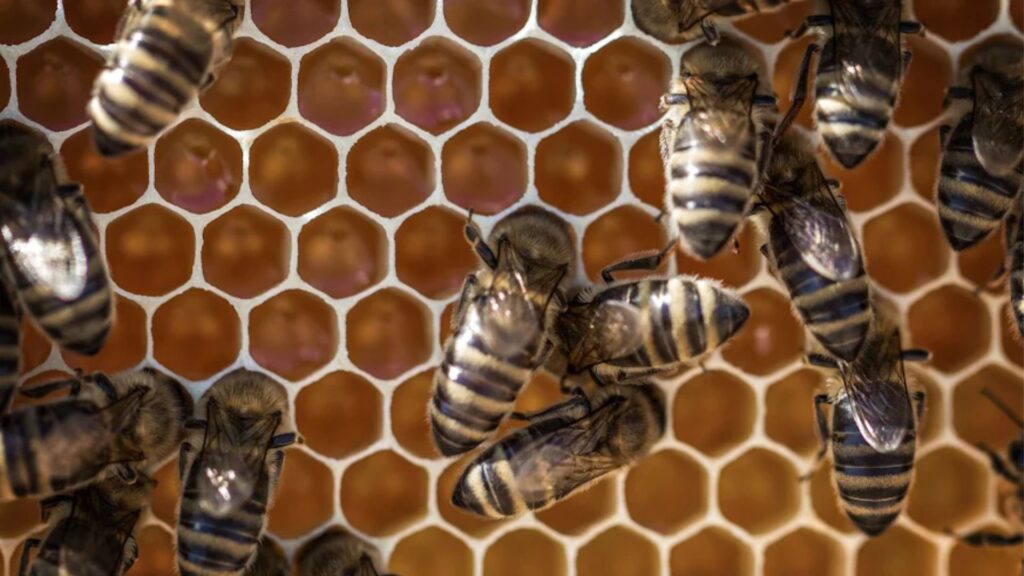In the midst of conflict and destruction, innovative solutions can emerge to tackle unexpected challenges: British scientists are working with local beekeepers to develop wax packaging for fresh produce.
The initiative comes at a critical time when Ukraine, Europe's largest honey producer, is facing major disruptions to its energy infrastructure. With Russian attacks disrupting energy supplies and causing power outages, this natural solution could help keep food fresh over the summer.
“I think everyone knows Ukraine is not in a good place at the moment,” Prof Les Bayle, of Cardiff University, told the BBC.
“As we all know, food will spoil quickly if it isn't preserved. Using beeswax wraps to kill bugs seems like a natural way to address this issue.”
The magic of beeswax mixtures
Cardiff-based scientists have been analysing individual beehives to determine which ones are best able to protect food. The team created different “recipes” by mixing mundane items available on the battlefield to create wraps that could effectively preserve food.
“The magic is in the mixture,” Vail said, explaining that scraps of cloth or paper are mixed with beeswax and naturally antibacterial plants like sage to create the wraps. Traditionally, the beeswax wraps are used to extend the shelf life of sandwiches, but they can also be used on other fresh foods.
The researchers looked at the use of propolis, a resin-like substance that honeybees produce from trees, and beeswax, which has natural antibacterial properties. They tested household items such as cotton fabric, food paper and cardboard, which they infused with beeswax, propolis and herbs such as sage, which are known for their antibacterial properties.
“Beeswax is water-repellent, so when used in packaging, it can protect against moisture,” says Dr. Yulia Yudina of the Faculty of Pharmacy at Kharkiv National Polytechnic University, “and it has been shown to be effective against bacteria and fungi.”
A joint effort between scientists and beekeepers
These beeswax wraps are developed through in-depth research and collaboration between scientists and Ukrainian beekeepers, who study individual beehives to find the best beeswax for food preservation.
“They have a lot of beeswax and they have a lot of bees,” Vail says. “Finding the right beeswax with the right properties can help extend the shelf life of food even further, which is especially important when you don't have refrigeration or power.”
While plastic wrap cannot keep food fresh indefinitely, it can significantly extend shelf life by several days — an extension that's crucial in conflict zones where power outages are frequent and lead to large amounts of food waste.
“The situation in conflict zones and near the front line is very difficult – people have no electricity and there are frequent power cuts,” Yudina told the BBC.
“[The wrap] It can be used to keep bread fresher, fruits and vegetables fresher.”
Spread and impact in war zones
These beeswax wraps may also be useful to many areas outside Ukraine. The researchers are spreading this knowledge and technology far and wide. Kharkiv Polytechnic University's Ukrainian partners are sharing this information online and on social media.
Despite the fierce fighting, they hope more Ukrainians will use this food preservation method.
“The situation in conflict zones and near the front lines is very difficult. Residents have no electricity and there are frequent power outages,” Yudina said, highlighting that the blackouts result in huge amounts of food waste.
“This wrap can be used to keep bread fresh, as well as fruits and vegetables fresh,” Yudina explained.
While the Ukrainian military is aware of the potential benefits of the beeswax wraps for its soldiers, Bayle and his team hope their work will not only benefit Ukrainians, but people in other conflict zones as well.
They aim to make a small but significant impact by harnessing the natural antibiotic properties of honey, a method used by the ancient Greeks.
“We have actually raised the idea with the Ukrainian military and we have seen a response. For us, if we can make even a small difference from the safety of our homes, it's worth it,” Bale concluded.
Newsletter
Blueprint Daily
Get the latest news in engineering, technology, space and science with The Blueprint.



